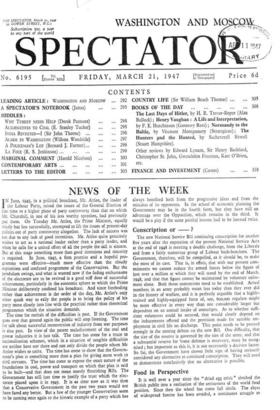Conscription or — ?
The new National Service Bill continuing conscription for another five years after the expiration of the present National Service Acts at the end of 1948 is meeting a double challenge, from the Liberals and from a fairly numerous group of Labour back-benchers. The Government, therefore, will be compelled, as it should be, to make the most of its case. That is, in effect, that with our present com- mitments we cannot reduce the armed forces below the figure of just over a million at which they will stand by the end of March, 1948, and that that figure cannot be maintained by voluntary enlist- ment alone. Both those contentions need to be established. Actual numbers in an army probably mean less today than they ever did in the history of warfare, and it is perfectly arguable that a highly- trained and highly-equipped force of, say, 600,000 regulars might be more effective in every way than one considerably larger but dependent on an annual intake of conscripts. As to whether suffi- cient volunteers could be secured, that would clearly depend on the inducements offered and the provision made for suitable em- ployment in civil life on discharge. This point needs to be pressed strongly in the coming debate on the new Bill. One difficulty, that the size of the reserve is governed by the size of the army, and that a substantial reserve for home defence is necessary, must be recog- nised ; but important as this is, it is not necessarily a decisive factor. So far, the Government have shown little sign of having seriously considered any alternative to continued conscription. They will need to demonstrate conclusively that no alternative is possible.


































